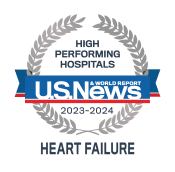Heart Failure

Heart failure means the heart muscle can't pump enough blood and oxygen the way it should to meet your body's needs.
It does not mean that your heart has stopped or is about to stop working.
Heart failure is a chronic, progressive condition and can affect one or both sides of the heart.
To make up for the inability to pump blood, the heart may:
- Become larger – Stronger contractions needed to pump more blood can enlarge the heart.
- Increase mass – Heart tissue becomes denser and, temporarily, stronger as the muscle grows.
- Pump faster – The heart pumps faster and stronger to maintain blood flow.
Other measures include narrowing blood vessels to maintain blood pressure and reducing circulation to other organs like the kidneys and brain.
These efforts may disguise heart failure but don’t stop it. Some people may not realize they have heart failure for years after their heart begins to weaken. Eventually, the heart and body can’t keep up. You may experience fatigue, breathing problems or other symptoms that result in a visit with your doctor.
As a high-performing hospital recognized by U.S. News & World Report, you’ll receive advanced heart failure care at the University of Maryland Heart and Vascular Center. To make an appointment or to learn more about our heart failure program, call 410-328-7877.
Heart Failure Types
There are three types of heart failure including left- and right-sided as well as congestive heart failure.
- Left-Sided Heart Failure – The left ventricle (lower chamber) can’t pump enough blood to the body.
- Right-Sided Heart Failure – The right ventricle (lower chamber) can’t pump enough blood to the lungs, and it backs up in the veins.
- Congestive Heart Failure – Fluid collects in the lungs and tissues, often causing swelling in the legs and ankles.
Heart Failure Symptoms
At first, you may only have symptoms when you are very active. Later, you may have breathing problems and other symptoms, even at rest. Symptoms may also appear suddenly after a heart attack or other condition that damages the heart.
Common symptoms include:
- Coughing
- Fatigue, weakness, faintness
- Loss of appetite
- Need to urinate at night
- Fast or irregular pulse, or palpitations
- Shortness of breath during activities or while lying down
- Shortness of breath that wakes you from sleep after a couple of hours
- Swollen liver or abdomen
- Swollen feet and ankles
- Weight gain
Heart Failure Causes
Conditions that can damage or overwork the heart muscle and result in heart failure include:
- High blood pressure (hypertension) – This is one of the most common causes of heart failure
- Heart attack – Damages the heart muscles and can result in heart failure
- Coronary artery disease (CAD) – Narrowing or blockage of the small blood vessels that supply blood and oxygen to the heart can result in heart failure
- Heart valve disease – Valves that are leaky or narrowed can lead to heart failure
- Congenital heart disease – Abnormalities present at birth, such as atrial septal defect or Tetralogy of Fallot
- Myocarditis – Inflammation of the heart muscle may occur because of viral infections or other causes
Diagnosing Heart Failure
University of Maryland Heart and Vascular Center heart failure specialists will review your health history and do a physical exam. You may also have imaging tests to see how well your heart pumps blood and the extent of any heart muscle damage. Diagnostic tests may include:
- Blood Tests – Find the cause of heart failure, identify risk factors and monitor medication side effects.
- CT – Computed tomography uses X-rays to make 2 and 3D images of your heart.
- Echocardiogram (Echo) – Uses sound waves to create a moving picture of the heart that is much more detailed than a plain X-ray image.
- MRI – Uses a magnetic field to make 3D images of the heart.
- Nuclear Imaging Stress Test – Measures heart blood flow while you are at rest and during exercise.
- PET – Positron emission tomography uses a radioactive tracer to evaluate blood flow in the heart.
- Ventriculography – Uses X-ray and contrast fluid to measure your heart’s ejection fraction (overall squeezing strength) and show which parts of the heart muscle are not moving well.
Heart Failure Treatment
Our heart specialists will develop an individualized care plan that best suits your needs. We offer comprehensive treatment options for heart failure that include lifestyle changes, medications, implantable cardioverter defibrillators (ICDs) and heart transplant.
Learn more about our approach to heart failure treatment.
Make an Appointment
Make an appointment with one of our heart failure specialists. Call 410-328-7877.

